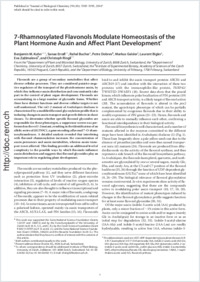7-rhamnosylated flavonols modulate homeostasis of the plant hormone auxin and affect plant development
- Kuhn, Benjamin M. Department of Plant and Microbial Biology, University of Zurich, Switzerland
- Errafi, Sanae Department of Plant and Microbial Biology, University of Zurich, Switzerland
- Bucher, Rahel Department of Chemistry, University of Zurich, Switzerland
- Dobrev, Petre Institute of Experimental Botany, Academy of Sciences of the Czech Republic, Prague, Czech Republic
- Geisler, Markus Department of Biology, University of Fribourg, Switzerland
- Bigler, Laurent Department of Chemistry, University of Zurich, Switzerland
- Zažímalová, Eva Institute of Experimental Botany, Academy of Sciences of the Czech Republic, Prague, Czech Republic
- Ringli, Christoph Department of Plant and Microbial Biology, University of Zurich, Switzerland
-
03.04.2016
Published in:
- Journal of Biological Chemistry. - 2016, vol. 291, no. 10, p. 5385–5395
English
Flavonols are a group of secondary metabolites that affect diverse cellular processes. They are considered putative negative regulators of the transport of the phytohormone auxin, by which they influence auxin distribution and concomitantly take part in the control of plant organ development. Flavonols are accumulating in a large number of glycosidic forms. Whether these have distinct functions and diverse cellular targets is not well understood. The rol1-2 mutant of Arabidopsis thaliana is characterized by a modified flavonol glycosylation profile that is inducing changes in auxin transport and growth defects in shoot tissues. To determine whether specific flavonol glycosides are responsible for these phenotypes, a suppressor screen was performed on the rol1-2 mutant, resulting in the identification of an allelic series of UGT89C1, a gene encoding a flavonol 7-O-rhamnosyltransferase. A detailed analysis revealed that interfering with flavonol rhamnosylation increases the concentration of auxin precursors and auxin metabolites, whereas auxin transport is not affected. This finding provides an additional level of complexity to the possible ways by which flavonols influence auxin distribution and suggests that flavonol glycosides play an important role in regulating plant development.
- Faculty
- Faculté des sciences et de médecine
- Department
- Département de Biologie
- Language
-
- English
- Classification
- Biological sciences
- License
-
License undefined
- Identifiers
-
- RERO DOC 259399
- DOI 10.1074/jbc.M115.701565
- Persistent URL
- https://folia.unifr.ch/unifr/documents/304874
Statistics
Document views: 128
File downloads:
- pdf: 226
